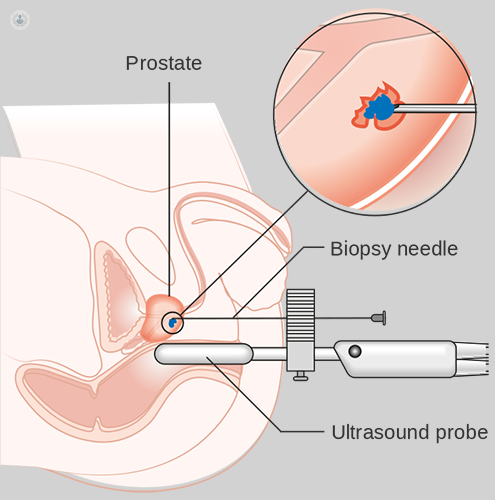Diagnosing prostate cancer - having a transperineal prostate biopsy
Written by:1 in 8 men in the UK will receive a diagnosis of prostate cancer in their lifetime. The prostate is a male gland located between the bladder and penis, surrounding the urethra. The prostate grows in size with age and its main purpose is to help make semen, which is the fluid that carries the sperm. Prostate cancer risk also increases with age, and hence men over the age of 50 are encouraged to be tested regularly for prostate cancer. Professor Francis Chinegwundoh MBE, a renowned urologist, explains how prostate cancer can be diagnosed with a transperineal prostate biopsy.

What is a prostate biopsy?
A prostate biopsy is a procedure whereby samples of the prostate gland are taken by a urologist and sent to a histopathologist for analysis. It is the means by which prostate cancer is diagnosed.
Why do I need a prostate biopsy?
If there is a suspicion that a man may have prostate cancer, either because the PSA blood test (prostate specific antigen is a chemical made by the prostate gland that is found in higher levels in the bloodstream when prostate cancer is present) or because the prostate gland feels abnormal when examined by a finger in the rectum, then a prostate biopsy is required. Generally, an MRI scan of the prostate gland is undertaken beforehand which may guide the urologist as to where to take samples of the prostate from.
How is a transperineal biopsy performed?
A transperineal prostate biopsy is the most accurate way of diagnosing prostate cancer. A needle is passed through the skin in the space between the testicles and the back passage (anus) and into the prostate gland. The man lies on his back with his legs held up, allowing the biopsies to be taken. In most cases, it is done under a general anaesthetic, but increasing numbers of urologists are performing such biopsies under a local anaesthetic. A transperineal biopsy does not cause pain, although there may be discomfort in the perineum afterwards where the skin has been punctured several times.
Is a prostate biopsy painful?
A transperineal biopsy has advantages over the transrectal biopsy route, in that the infection risk is lower and the prostate can be better sampled.
How long does it take for the results to come through?
The results are generally available 7-10 days after the biopsy.


